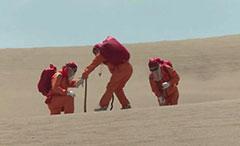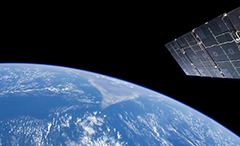Experiments solicited for space station
2018-08-08
China Daily
China has begun to solicit proposals for scientific and technological experiments from the international research community to be conducted aboard its manned space station scheduled to enter service around 2022.
The China Academy of Space Technology, developer of the space station, has set up a committee involving 14 top Chinese space scientists to solicit, review and select experiments submitted by researchers from around the world who wish to take advantage of the Chinese spacecraft to boost their research.
Preferred fields include physics, material synthesis and in-space manufacturing as well as astrochemistry and bioengineering, according to a release from the academy on Aug 6.
The academy said it hopes the move will help strengthen international cooperation in space exploration, noting the review and selection process will be made in accordance with international norms and universal practices.
It said experiments selected by the committee will be transferred to the China Manned Space Agency for final selection.
“We hope that our space station will become an incubator for space-related industries and can help to breed and develop new technologies that will benefit humanity,” said Zhang Hongtai, president of the academy.
He said that experiments that fail to gain final approval will still have a chance to be carried out by other spacecraft developed by the academy.
The academy has set up a website — www.css-research.cn — for those wishing to submit proposals, according to Zhang.
In late May, the United Nations Office for Outer Space Affairs and the China Manned Space Agency jointly published their first announcement inviting scientists from around the world to submit research proposals for an opportunity to conduct their experiments aboard the Chinese space station.
Moreover, China has announced that it welcomes foreign astronauts on its space station and has trained two European astronauts in sea survival techniques in preparation for the space station mission.
Yang Liwei, former head of the China Manned Space Agency, previously told China Daily that Chinese engineers have dedicated considerable resources in the station for international collaboration.
He said foreign countries can either work with China in the development of some equipment installed inside the station, or place their own devices within. Chinese engineers also designed adapters on the station that can dock with foreign spacecraft, he added.
China will start piecing together its first manned space station around 2020.
First, a Long March 5B heavy-lift rocket, which is being developed by Chinese scientists, will put the station’s core module into orbit that year. Next, about four manned space flights will be made to send astronauts to assemble the station.
The space station is expected to be fully operational by around 2022, and is set to operate for about 15 years, according to the China Academy of Space Technology.
In 2024, it will likely become the world’s only space station if the United States-led International Space Station is retired that year as planned.
The multimodule station, named Tiangong, or Heavenly Palace, will be mainly composed of three parts — a core module attached to two space labs — having a combined weight of more than 90 metric tons, the academy said.
The station will be able to carry more than 10 tons of scientific and experimental equipment, and it will have 26 internal payload cabinets, 67 external hatches designed to dock with medium-sized extravehicular devices and four external points for towing large instruments, according to designers.


